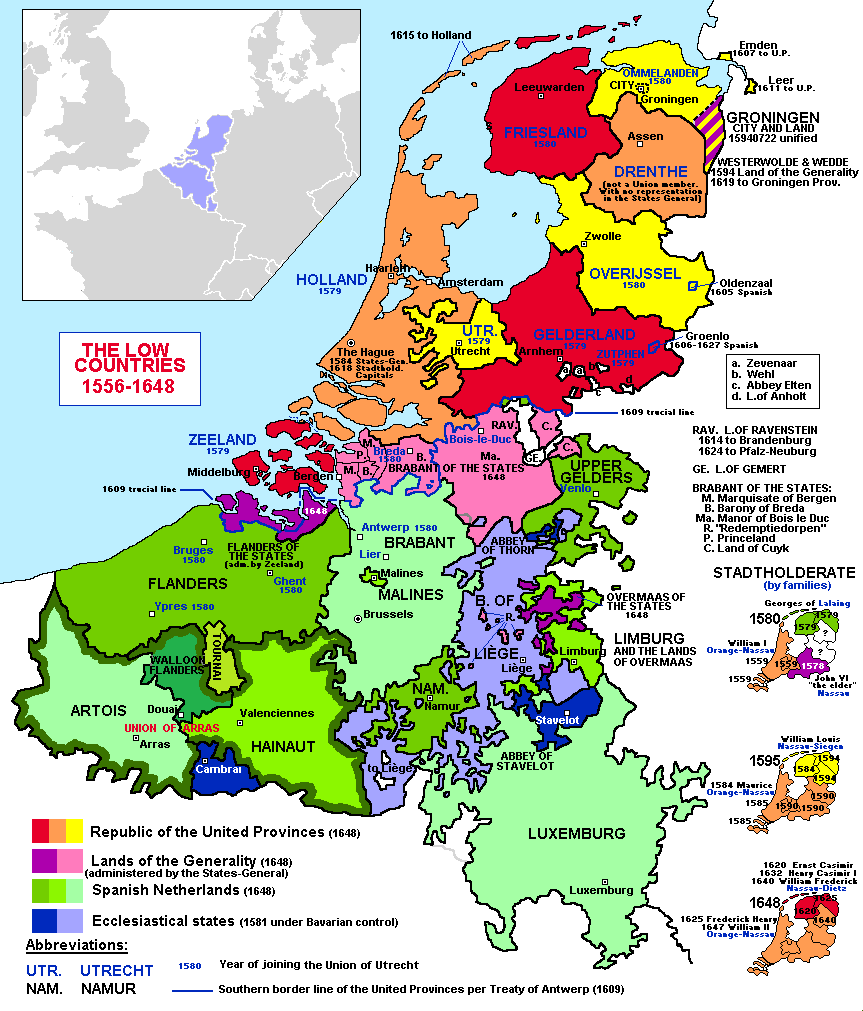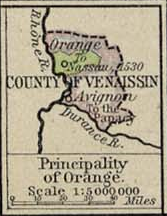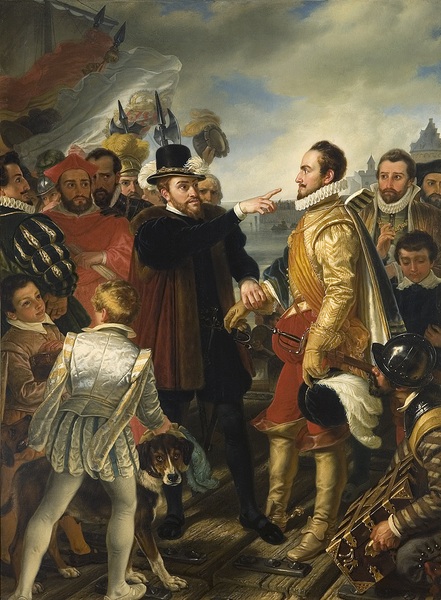|
Coornhert
Dirck Volckertszoon Coornhert (152229 October 1590), also known as Theodore Cornhert, was a Dutch writer, philosopher, translator, politician, theologian, and artist. Coornhert is often considered the Father of Dutch Renaissance scholarship. Biography Coornhert was the youngest son of Volckert Coornhert, an Amsterdam cloth merchant. As a child, he spent some years in Spain and Portugal. Returning home, he was disinherited by his father's will in 1539, for his marriage with Cornelia (Neeltje) Simons, a portionless gentlewoman from Haarlem, whose sister was Anna Simonsdr, the mistress of Reginald (Reinoud), count of Brederode (they were the parents of Lucretia van Brederode). He was only seventeen and she was twelve years older. Through his sister-in-law, he became major-domo to Reginald at his castle in Vianen for a short time. Soon after that, in 1541, he bought a house in his wife's hometown of Haarlem on the St. Janssteeg from Anna and her husband Jan. Though he started of ... [...More Info...] [...Related Items...] OR: [Wikipedia] [Google] [Baidu] |
Haarlem
Haarlem (; predecessor of ''Harlem'' in English language, English) is a List of cities in the Netherlands by province, city and Municipalities of the Netherlands, municipality in the Netherlands. It is the capital of the Provinces of the Netherlands, province of North Holland. Haarlem is situated at the northern edge of the Randstad, one of the Largest European cities and metropolitan areas, more populated metropolitan areas in Europe; it is also part of the Amsterdam metropolitan area. Haarlem had a population of in . Haarlem was granted city status or in 1245, although the first city walls were not built until 1270. The modern city encompasses the former municipality of Schoten, Netherlands, Schoten as well as parts that previously belonged to Bloemendaal and Heemstede. Apart from the city, the municipality of Haarlem also includes the western part of the village of Spaarndam. Newer sections of Spaarndam lie within the neighbouring municipality of Haarlemmermeer. Geography ... [...More Info...] [...Related Items...] OR: [Wikipedia] [Google] [Baidu] |
Dutch Renaissance
The Renaissance in the Low Countries was a cultural period in the Northern Renaissance that took place in around the 16th century in the Low Countries (corresponding to modern-day Belgium, the Netherlands and French Flanders). Culture in the Low Countries at the end of the 15th century was influenced by the Italian Renaissance, through trade via Bruges, which made Flanders wealthy. Its nobles commissioned artists who became known across Europe. In science, the anatomist Andreas Vesalius led the way; in cartography, Gerardus Mercator's map assisted explorers and navigators. In art, Dutch and Flemish Renaissance painting went from the strange work of Hieronymus Bosch to the everyday life of Pieter Brueghel the Elder. In architecture, music and literature too, the culture of the Low Countries moved into the Renaissance style. Geopolitical situation and background In 1500, the Seventeen Provinces were in a personal union under the Burgundian Dukes, and with the Flemish cities a ... [...More Info...] [...Related Items...] OR: [Wikipedia] [Google] [Baidu] |
Cornelis Van Haarlem
Cornelis Corneliszoon van Haarlem (1562 – 11 November 1638) was a Dutch Golden Age painter and draughtsman, one of the leading Northern Mannerist artists in the Netherlands, and an important forerunner of Frans Hals as a portraitist. Biography Born in Haarlem, Cornelis Corneliszoon was a pupil of Pieter Pietersz in Haarlem, and later Gillis Coignet in Antwerp.Cornelis Cornelisz. van Haarlem in the He is known among art historians as a member of the Haarlem Mannerists, who were highly influenced by the work of |
Maarten Van Heemskerck
Maarten van Heemskerck (born Maerten Jacobsz van Veen; 1 June 1498 – 1 October 1574), also known as Marten Jacobsz Heemskerk van Veen, was a Dutch portrait and religious painter, who spent most of his career in Haarlem. He was a pupil of Jan van Scorel, and adopted his teacher's Italian-influenced style. He spent the years 1532–36 in Italy. He produced many designs for engravers, and is especially known for his depictions of the Wonders of the World. Biography Early life Heemskerck was born in the village of Heemskerk, North Holland, halfway between Alkmaar and Haarlem. He was the son of a farmer called Jacob Willemsz. van Veen, later buried in the Dorpskerk, Heemskerk, village churchyard. According to his biography by Karel van Mander, he began his artistic training with the painter Cornelius Willemsz in Haarlem, but was recalled to Heemskerk by his father to work on the family farm. However, having contrived an argument with his father he left again, this time for Delft, ... [...More Info...] [...Related Items...] OR: [Wikipedia] [Google] [Baidu] |
Prince Of Orange
Prince of Orange (or Princess of Orange if the holder is female) is a title associated with the sovereign Principality of Orange, in what is now southern France and subsequently held by the stadtholders of, and then the heirs apparent of, the Netherlands. The title "Prince of Orange" was created in 1163 by Holy Roman Emperor Frederick Barbarossa, by elevating the county of Orange to a principality, in order to bolster his support in that area in his conflict with the Papacy. The title and land passed to the French noble houses of Baux, in 1173, and of Chalons, in 1393, before arriving with René of Nassau in 1530. The principality then passed to René's cousin, the German-born nobleman from then Spanish Netherlands, William (known as "the Silent"), in 1544. Subsequently, William led a successful Dutch revolt against Spain, however with independence the new country became a decentralized republic rather than a unitary monarchy. In 1702, after William the Silent's gre ... [...More Info...] [...Related Items...] OR: [Wikipedia] [Google] [Baidu] |
William The Silent
William the Silent or William the Taciturn (; 24 April 153310 July 1584), more commonly known in the Netherlands as William of Orange (), was the leader of the Dutch revolt against the Spanish Habsburg Netherlands, Habsburgs that set off the Eighty Years' War (1568–1648) and resulted in the formal independence of the Dutch Republic, United Provinces in 1648. Born into the House of Nassau, he became Prince of Orange in 1544 and is thereby the founder of the House of Orange-Nassau, Orange-Nassau branch and the ancestor of the monarchy of the Netherlands. In the Netherlands, he is also known as Father of the Nation, Father of the Fatherland (; ). A wealthy nobleman, William originally served the Habsburgs as a member of the court of Margaret of Parma, governor of the Spanish Netherlands. Unhappy with the centralisation of political power away from the local estates and with the Spanish persecution of Dutch Protestants, William joined the Dutch uprising and turned against his fo ... [...More Info...] [...Related Items...] OR: [Wikipedia] [Google] [Baidu] |
Dutch Revolt
The Eighty Years' War or Dutch Revolt (; 1566/1568–1648) was an armed conflict in the Habsburg Netherlands between disparate groups of rebels and the Spanish government. The causes of the war included the Reformation, centralisation, excessive taxation, and the rights and privileges of the Dutch nobility and cities. After the initial stages, Philip II of Spain, the sovereign of the Netherlands, deployed his armies and regained control over most of the rebel-held territories. However, widespread mutinies in the Spanish army caused a general uprising. Under the leadership of the exiled William the Silent, the Catholic and Protestant-dominated provinces sought to establish religious peace while jointly opposing the king's regime with the Pacification of Ghent, but the general rebellion failed to sustain itself. Despite Governor of Spanish Netherlands and General for Spain, the Duke of Parma's steady military and diplomatic successes, the Union of Utrecht continued ... [...More Info...] [...Related Items...] OR: [Wikipedia] [Google] [Baidu] |
Burgomaster
Burgomaster (alternatively spelled burgermeister, ) is the English form of various terms in or derived from Germanic languages for the chief magistrate or executive of a city or town. The name in English was derived from the Dutch . In some cases, burgomaster was the title of the head of state and head of government of a sovereign (or partially or de facto sovereign) city-state, sometimes combined with other titles, such as Hamburg's First Mayor and President of the Senate). Contemporary titles are commonly translated into English as ''mayor''. Historical use * The title "burgermeister" was first used in the early 13th century. * In history (sometimes until the beginning of the 19th century) in many free imperial cities (such as Bremen, Hamburg, Lübeck, etc.) the function of burgomaster was usually held simultaneously by three persons, serving as an executive college. One of the three being burgomaster in chief for a year (called in some cases in ; in ''presiding burg ... [...More Info...] [...Related Items...] OR: [Wikipedia] [Google] [Baidu] |
Anicius Manlius Severinus Boethius
Anicius Manlius Severinus Boethius, commonly known simply as Boethius (; Latin: ''Boetius''; 480–524 AD), was a Roman Roman Senate, senator, Roman consul, consul, ''magister officiorum'', polymath, historian, and philosopher of the Early Middle Ages. He was a central figure in the translation of the Greek classics into Latin, a precursor to the Scholasticism, Scholastic movement, and, along with Cassiodorus, one of the two leading Christian scholars of the 6th century. The local cult of Boethius in the Diocese of Pavia was sanctioned by the Sacred Congregation of Rites in 1883, confirming the diocese's custom of honouring him on the 23 October. Boethius was born in Rome a few years after the forced abdication of the last Western Roman Empire, Western Roman emperor, Romulus Augustulus. A member of the Anicii family, he was orphaned following the family's sudden decline and was raised by Quintus Aurelius Memmius Symmachus, a later Roman consul, consul. After mastering both Latin ... [...More Info...] [...Related Items...] OR: [Wikipedia] [Google] [Baidu] |
Seneca The Younger
Lucius Annaeus Seneca the Younger ( ; AD 65), usually known mononymously as Seneca, was a Stoicism, Stoic philosopher of Ancient Rome, a statesman, a dramatist, and in one work, a satirist, from the post-Augustan age of Latin literature. Seneca was born in Córdoba, Spain, Colonia Patricia Corduba in Hispania, and was trained in rhetoric and philosophy in Rome. His father was Seneca the Elder, his elder brother was Lucius Junius Gallio Annaeanus, and his nephew was the poet Lucan. In AD 41, Seneca was exiled to the island of Corsica under emperor Claudius, but was allowed to return in 49 to become a tutor to Nero. When Nero became emperor in 54, Seneca became his advisor and, together with the praetorian prefect Sextus Afranius Burrus, provided competent government for the first five years of Nero's reign. Seneca's influence over Nero declined with time, and in 65 Seneca was executed by forced suicide for alleged complicity in the Pisonian conspiracy to Assassination, assassinate ... [...More Info...] [...Related Items...] OR: [Wikipedia] [Google] [Baidu] |
Cicero
Marcus Tullius Cicero ( ; ; 3 January 106 BC – 7 December 43 BC) was a Roman statesman, lawyer, scholar, philosopher, orator, writer and Academic skeptic, who tried to uphold optimate principles during the political crises that led to the establishment of the Roman Empire. His extensive writings include treatises on rhetoric, philosophy and politics. He is considered one of Rome's greatest orators and prose stylists and the innovator of what became known as "Ciceronian rhetoric". Cicero was educated in Rome and in Greece. He came from a wealthy municipal family of the Roman equestrian order, and served as consul in 63 BC. He greatly influenced both ancient and modern reception of the Latin language. A substantial part of his work has survived, and he was admired by both ancient and modern authors alike. Cicero adapted the arguments of the chief schools of Hellenistic philosophy in Latin and coined a large portion of Latin philosophical vocabulary via ... [...More Info...] [...Related Items...] OR: [Wikipedia] [Google] [Baidu] |
Latin Language
Latin ( or ) is a classical language belonging to the Italic languages, Italic branch of the Indo-European languages. Latin was originally spoken by the Latins (Italic tribe), Latins in Latium (now known as Lazio), the lower Tiber area around Rome, Italy. Through the expansion of the Roman Republic, it became the dominant language in the Italian Peninsula and subsequently throughout the Roman Empire. It has greatly influenced many languages, Latin influence in English, including English, having contributed List of Latin words with English derivatives, many words to the English lexicon, particularly after the Christianity in Anglo-Saxon England, Christianization of the Anglo-Saxons and the Norman Conquest. Latin Root (linguistics), roots appear frequently in the technical vocabulary used by fields such as theology, List of Latin and Greek words commonly used in systematic names, the sciences, List of medical roots, suffixes and prefixes, medicine, and List of Latin legal terms ... [...More Info...] [...Related Items...] OR: [Wikipedia] [Google] [Baidu] |











